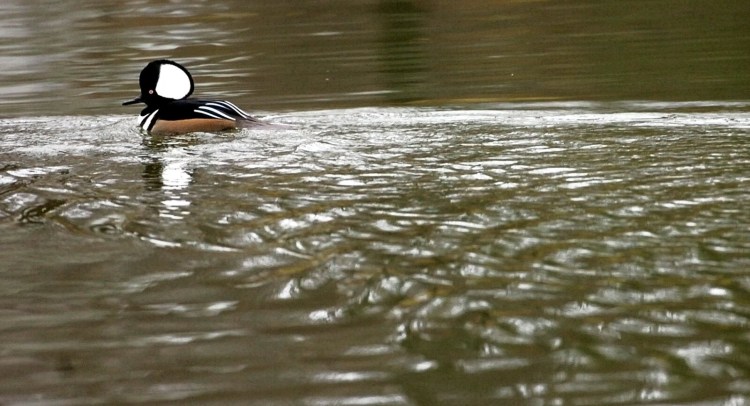As a word lover, I find bird names to be an endless source of fascination. Some intriguing common names are folk names or regional names. For instance, bluebill, baldpate, log-cock, high-hole and rain crow are all species that occur in Maine.
Waldo McAtee (1883-1962), an avian etymologist, collected such colloquial names of North American birds. His list exceeds half a million common names for the roughly 800 species that occur regularly on our continent.
The difficulty with common names is that confusion may arise over the particular species in question. For instance, the colloquial name of log-cock for the pileated woodpecker could reasonably be used to describe a ruffed grouse.
Biologists avoid the uncertainty of common names by using the standardized scientific name, which consists of a genus name and a species name. However, most birders don’t care to commit lots of Latin names to memory.
Fortunately, the Check-list Committee of the American Ornithologists’ Union published a list of standard common names in 1957. The checklist is periodically revised to reflect increasing knowledge of bird classification. The common names used in field guides are these standardized common names. Use of these names rather than colloquial names reduces confusion. It is also a lot easier to say you saw three evening grosbeaks than three Coccothraustes vespertinus!
Some standardized common names are descriptive and easily understood. For instance, woodpecker is a highly appropriate name for those birds which probe dead wood for insects. Flycatcher is another straightforward descriptive name.
Other names are more obscure but interesting in terms of their word origin.
Cormorants are often seen along the seashore, major rivers and on larger lakes in our region. Cormorant comes from two Latin words: corvus, meaning crow and marinus, meaning marine. So, cormorant is another way of saying sea-crow. Cormorants have little in common with crows besides their black plumage but the derivation of the word is charming.
Loon is a term derived from the Shetland word loom or the Icelandic word lomr. Both words mean lame and aptly describe the loons’ awkward gait on land.
Hooded and common mergansers are frequently seen on larger bodies of water in our area. Merganser comes from two Latin words: mergus, meaning diver and anser, meaning goose. A perfectly apt description of these birds.
Falcon comes from the Latin falx, meaning sickle. The powerful bill of a falcon certainly bears a functional similarity to a sickle.
Gull comes from the Latin gula, meaning throat. Just like a person who is gullible, a gull will swallow anything!

The derivation for “gull” is from the Latin “gula,” or “throat.” As evident in this photo (and on any summer beach in Maine), the birds will put anything down their throats, here a cupcake taken from the mouths of babes. David Leaming/Morning Sentinel
Color may be the basis of the common name of birds. The northern cardinal is named for the high church official who wears a bright red robe. The northern oriole’s name comes from the Middle Latin oriolus or the Latin aureolus, meaning golden.
The eastern kingbird is so named because of the small patch of red feathers on the top of its head that the male exposes when it is excited. The ruby-crowned kinglet is a much smaller bird but males have the same type of red crown as the kingbird.
We often say that birds chirp. This trait has given rise to at least two standardized common names. The American pipit, a bird that breeds on Mt. Katahdin and may be found in our state in agricultural fields in the spring and fall, has a name derived from the Latin pipo, meaning to chirp. The Swedish word siska means a chirper and gives us the common name for the pine siskin.
Finally, some standardized names are based on the calls or songs of birds. Good examples of this type of common name are chickadee, whip-poor-will, cuckoo, curlew and towhee. The doleful call of the mourning dove gives this bird its name.
Herb Wilson taught ornithology and other biology courses at Colby College. He welcomes reader comments and questions at whwilson@colby.edu.
Copy the Story LinkSend questions/comments to the editors.



Success. Please wait for the page to reload. If the page does not reload within 5 seconds, please refresh the page.
Enter your email and password to access comments.
Hi, to comment on stories you must . This profile is in addition to your subscription and website login.
Already have a commenting profile? .
Invalid username/password.
Please check your email to confirm and complete your registration.
Only subscribers are eligible to post comments. Please subscribe or login first for digital access. Here’s why.
Use the form below to reset your password. When you've submitted your account email, we will send an email with a reset code.